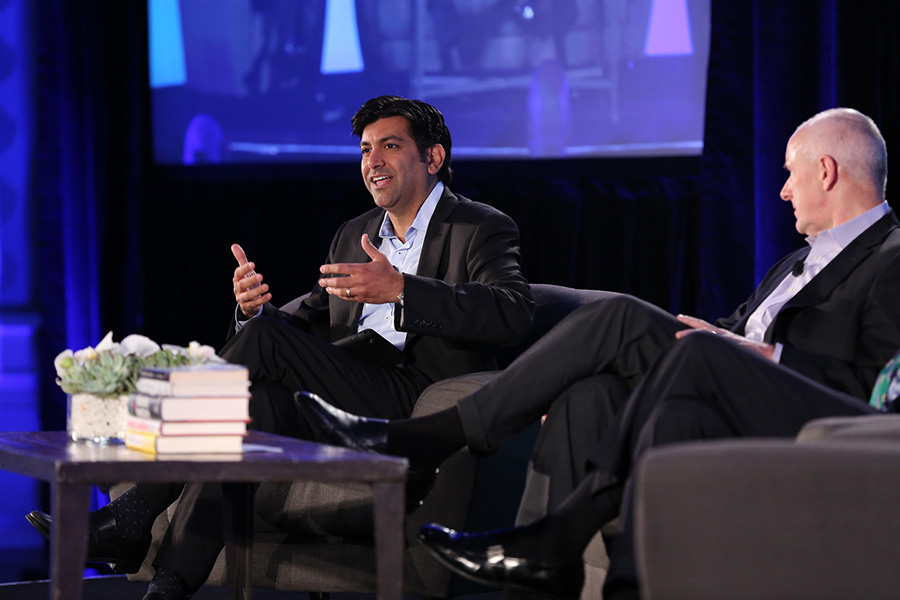Aneesh Chopra was the first CTO of the United States. Since then, he has been involved with government initiatives including the President’s Strategy for American Innovation, Startup America, the Open Innovator’s Toolkit and Blue Button.
Today, he’s President of CareJourney, an open data membership service building a rating system for physicians, networks, facilities and markets as they transition to value-based care.
Health Evolution Editor-in-Chief Tom Sullivan spoke with Chopra about the quasi-religious movement in Washington to control health care costs, what hasn’t worked so well, and why he credits “infrastructure and luck” for his career success.
Health Evolution: Looking back since you were the first US CTO in 2009, what changes have excited you the most?
Chopra: Three changes excite me the most. First, the bipartisan agreement that we as a country need to figure out how to achieve health care inflation no greater than the overall GDP without relying on traditional benefit cuts, rationing, reimbursement cuts. That’s a religion that began in ‘09 that had early tenants in both parties that the inflation-constraining future is in our grasp and possible if we can deliver and incentivize better care.
Second, we’ve seen government play a constructive collaborator role — for those who have idealistic issues that government should be either heavy-handed or hands off, here we have a Goldilocks “just right” approach. That includes the practice that data collected by the government would be accessible for public use, transparent and scalable but then leaving detailed implementation steps to the private sector to unleash innovation.
Third is our surgical or hyper-targeting regulatory interventions where markets have clearly failed. For example, the interoperability provisions around data needed a hammer, it’s the Trump Administration dropping the biggest hammer, building on the progress of the Obama Administration.
Health Evolution: And what still hasn’t moved fast enough?
Chopra: I would have hoped by now that the religious movement of better care equaling lower costs would have more data points and scaled to bring valuable results outside local markets. We are weak on the evidence base either because we haven’t generated evidence, per se, or haven’t done a good job documenting it. I remain a little bit anxious because a religious movement can only last so long — you want the science to back it up and we haven’t gotten there just yet.
Health Evolution: What is the biggest career risk you’ve taken? What was the pay off?
Chopra: In 2006, I was a managing director at The Advisory Board, in a very happy career. A friend was elected governor of Virginia and invited me to serve in his cabinet. My very first government job. I was not on a first-name basis with the legislature, did not know the workings of the state, but felt there was an opportunity to make a big difference because the Governor’s first words in the interview were ‘I’d like to advance health IT.’
Who would have thought essentially a nobody in a state role within 3 years would become the nation’s CTO?
Health Evolution: Hard to think of you as a nobody. That said, how did you make the jump to becoming the first CTO serving President Obama’s administration.
Chopra: Infrastructure and luck. Infrastructure because Virginia was a well-managed state so I could afford the time and effort to put emphasis on data and innovation. Luck in that Governor Tim Kaine was vetted as a prospective VP candidate, which shone a light on Virginia being managed well. There was a big New York Times story, and also luck in that there were not a lot of states with that kind of background. I happened to be sitting in the chair of the place working on those, so it was natural to define what a CTO would look like. I assumed a Silicon Valley luminary would get the job, but the President chose someone from what I would describe as “minor league” experience at the state-level instead – which I think was smart because the actual day to day role of the CTO was artfully navigating policy to advance the priorities of the President.
Health Evolution: What’s the best piece of leadership advice you ever received?
Chopra: David Bradley, founder of the Advisory Board Company, instilled in us a set of values he embraced as a leader. Chief among those that inspired me was the spirit of generosity, which is a philosophy where any person you’re engaging with actually gets more out of the interaction than you do. It speaks to the broader notion of humility and earning the trust and support to lead – I got a lot out of that.
Health Evolution: What’s next for CareJourney?
Chopra: We’re built on the proposition that we should find interventions that seem to work on specific patient populations, validate the findings, and disseminate the results of that research as far and wide as we can – we inventory clinical interventions for our members such as the value of Annual Wellness Visits for the frail elderly, or care transition visits for complex chronic patients, and make the resulting benchmarks available to all members. Our core engine is our “innovator” license to national CMS data sets. We model research studies, preferably ones available for public use, peer reviewed literature, or member-led inquiries and we combine that with work with our processing capabilities for beneficiary-level analysis, and make that available to organizations operating in value-based care models. Today, we rely on Medicare data and we hope to build on CMS’ forthcoming Medicaid encounters, and hopefully soon, openly available commercial databases to develop a trusted, transparent performance ratings system to drive our industry towards better care at lower cost.










